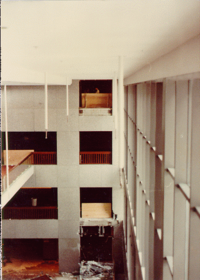
Photo from wikipedia
Purpose To evaluate differential surgical interventions for obstructive sleep apnea (OSA) patients with single-level retropalatal based on the preoperative topographical diagnosis using nasoendoscopy with Müller’s maneuver during supine position (MM-P).… Click to show full abstract
Purpose To evaluate differential surgical interventions for obstructive sleep apnea (OSA) patients with single-level retropalatal based on the preoperative topographical diagnosis using nasoendoscopy with Müller’s maneuver during supine position (MM-P). Subjects and methods This case series included adult patients with OSA who showed a predominant single-level retropalatal collapse on MM-P. An anteroposterior pattern of collapse was managed by an anterior advancement procedure, while a transverse pattern of collapse was managed by lateral/anterolateral advancement procedures (double suspension sutures). A combined procedure was provided to the concentric type of collapse. All patients underwent evaluation of the polysomnography, Epworth Sleepiness Scale (ESS) values and snoring scores both preoperatively and 6–8 months after surgery. Results Among 102 patients , the most commonly reported pattern of collapse at the retropalatal level was the concentric pattern (48.04%) followed by the transverse pattern (27.45%). The AP-pattern of collapse was reported in 24.51%. In the postoperative follow-up visits, no early or late complications were reported. All included groups showed significant improvement in polysomnographic data (mean AHI and lowest O 2 saturation level). Significant improvement of VAS of snoring was reported. The overall success rate was ˃90% . Conclusion Preoperative differential diagnosis of OSA with MM-P allows for tailored surgical management. Tailored procedures could yield good surgical outcomes when patients are properly selected and the technique is chosen according to preoperative topographical diagnostic assessment. This study might provide an available less-costly and effective preoperative planning for OSA intervention. Level of evidence 4.
Journal Title: European Archives of Oto-Rhino-Laryngology
Year Published: 2021
Link to full text (if available)
Share on Social Media: Sign Up to like & get
recommendations!